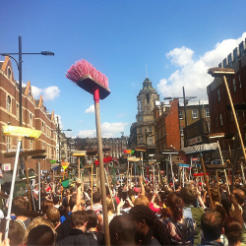Recent figures showed that the Olympics hasn't been as successful as hoped in encouraging volunteers to step up. Dan Thompson questions the methodology.
As the days get shorter and the weeks get colder, it’s hard to remember what Britain felt like this summer. Wherever you stood politically, London 2012 captured the public’s imagination.
While the elite athletes did Britain proud, for every medal winner there were over 10,000 volunteers making sure the whole games ran smoothly. City Ambassadors made the host cities friendly and legible for visitors, while Games Makers provided all the logistical support, from welcoming the public to the Olympic venues to providing expert support behind the scenes.
For the first time ever, uniformed volunteers were highly visible across the country and volunteering was part of everyday conversation.
But now, the Church Urban Fund is telling us, all that is history. Their survey, the Volunteering Gap, found that only a third of people are volunteering at all, and just 17 per cent volunteer for charities or community groups. Those figures show an interesting gap, between people who volunteer and those who do it for formal, organised charities and community groups.
So what’s happening, and is the Olympic volunteering spirit still alive? Firstly, let’s remember that a third of people volunteering is 20 million, which is a significant number. But if they’re not volunteering formally, how are they doing it?
Times have changed
The answer probably lies in a younger generation, using social media and mobile technology. They’re creating more ad hoc organisations which are very locally based, and relying on just enough people coming together to do a thing that needs to be done. In short we’re seeing what internet thinker Clay Shirky called ‘organising without organisations’.
There’s evidence of a revolution in the way volunteering happens across our towns and cities. People aren’t willing to commit time and hours to somebody else’s good cause, but they’re more than willing to do things that need to be done, on their own terms and in their own time.
Guerilla gardening has become a mainstream activity, with people taking over the maintenance of old planters and unloved corners of civic land. There’s no organisation, and it’s done without anybody’s permission.
The internet recycling scheme Freegle has over 360 groups across Great Britain, with a total of 1,414,855 members, and is run by local volunteer moderators.
In my home town, Adur & Worthing Council Services are encouraging local cleaning champions, giving them a broom to help sweep up leaves and pick up litter in their own street.
And exactly a year before the Olympics, we saw the biggest outbreak of mass cleaning since the Blitz, when an estimated 12,000 people joined the #riotcleanup movement. Again, there was no organisation, and nobody was in charge.
And the government recognises the potential of volunteering, sinking official resource into the volunteering movement both through its National Citizen Service programme for young people and through funding for individual projects. #wewillgather is one of those projects, and a direct descendent of the #riotcleanup act. It uses social media to help people come together for small actions in their own neighbourhood.
What all of these projects illustrate is that the volunteering bug that was so visibly manifest at this year’s Olympics is far from over. Outdated research models may not be tracking it, but a new model of volunteering is very much alive and kicking.









